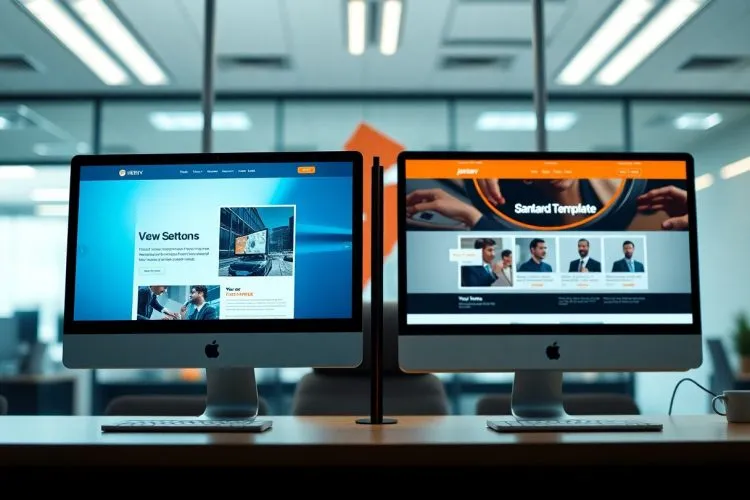
Over the years, selecting the right web designer for your project has become increasingly important, especially in New Jersey’s competitive market. You want to ensure your website not only looks great but also functions effectively to meet your business goals. To help you navigate this process, we’ve compiled a list of key questions to ask potential designers. For additional guidance, check out the article on 5 Steps to Hiring a Freelance Web Designer in New Jersey.
Key Takeaways:
- Experience: Inquire about the web designer’s background and years of experience in the industry to assess their expertise.
- Portfolio: Request to see their previous work to evaluate their design style and the range of projects they have handled.
- Services Offered: Confirm the variety of services they provide, such as SEO, content creation, and maintenance to ensure they meet your needs.
- Communication Skills: Assess their communication style and responsiveness, as clear communication is key to a successful collaboration.
- Budget Alignment: Discuss your budget upfront to ensure the designer can work within your financial constraints while delivering quality work.
Understanding Your Needs
The first step in selecting the right web designer in NJ is understanding your specific needs. By clearly defining what you want, you can align your vision with the skills and services offered by potential designers. Having a thorough grasp of your goals and audience will streamline the selection process and help ensure you find a designer who can deliver the results you seek.
Define Your Goals
An effective web design project begins with clearly defining your goals. Consider what you want to achieve with your website. Whether it’s increasing sales, generating leads, or enhancing your brand’s online presence, establishing these objectives will guide your conversations with designers.
Identify Your Target Audience
Targeting your audience accurately is vital for your web design project to resonate with the right people. Understanding who your visitors are will help you hone in on design decisions that speak directly to their interests and preferences.
This means you should think about demographics such as age, location, interests, and online behavior. By identifying characteristics of your target audience, you can ask your web designer to create a site that not only attracts visitors but also engages them effectively. Knowing your audience will inform design choices, content strategy, and user experience, ensuring your website serves its intended purpose and connects with the right users.

Key Factors to Consider
You need to evaluate several key factors when choosing a web designer in NJ to ensure you make the right choice. Look for the following:
- Experience and portfolio
- Technical skills and expertise
- Communication style
- Client testimonials and reviews
The more informed you are, the better equipped you’ll be to find a designer who meets your specific needs.
Experience and Portfolio
Assuming you want a visually appealing and functional website, reviewing a designer’s experience and portfolio is important. A strong portfolio can showcase their style, creativity, and expertise, giving you insight into how they translate ideas into engaging web designs.
Technical Skills and Expertise
There’s no denying that the technical skills a web designer possesses play a significant role in the success of your website. You should seek a designer well-versed in various programming languages, content management systems, and responsive design principles.
It’s important to inquire about their familiarity with current web technologies and best practices, as this knowledge can significantly impact the performance and user experience of your site. A designer with robust technical expertise will ensure your site is not only visually appealing but also optimized for speed, security, and SEO, which is key for attracting and retaining visitors.
Essential Questions to Ask
Many web designers have varied approaches and specialties. To find the right fit for your project, it’s important to ask specific questions that unveil their expertise, processes, and how they will cater to your unique goals. By doing so, you can assess whether they align with your vision and expectations.
Inquiry About Design Process
With a clear understanding of the designer’s process, you can gauge how they approach projects. Ask about their workflow, timeline, and how they gather input from clients. A structured process often leads to a more efficient project and a final product that truly reflects your brand.
Discuss SEO and Marketing Knowledge
For any website to succeed, it needs to be visible. Understanding a designer’s knowledge of SEO and marketing is vital. You’ll want to discuss how they integrate SEO best practices in their designs and whether they offer strategies for driving traffic to your site.
Essential to your online success, SEO and marketing insights from your web designer can significantly impact your visibility. Inquire about their experience with keyword optimization, link-building strategies, and how they stay updated with search engine algorithms. A designer who comprehensively understands SEO can ensure that your website is not just aesthetically pleasing but also positioned to attract and retain visitors effectively.

Communication and Collaboration
To ensure a fruitful partnership, effective communication and collaboration are crucial when choosing a web designer in NJ. You should explore how they convey ideas and updates, as well as their responsiveness to your inquiries. For deeper insights, consider reviewing the 25 Questions to Ask Your Website Designer Before Hiring.
Assessing Responsiveness
Assuming you have chosen a web designer, their responsiveness will be key to the project’s success. Evaluate how quickly they respond to emails or requests for information. A designer who values your time and feedback will enhance the overall workflow.
Evaluating Collaborative Tools
The tools a web designer uses for collaboration can significantly impact your project’s efficiency. Inquire about their preferred platforms for sharing progress, gathering feedback, and managing tasks. Understanding these tools can give you a sense of how accessible your designer will be and how easily you can provide input throughout the project’s lifecycle.
To facilitate seamless collaboration, ensure that your web designer employs effective project management tools, such as Trello, Asana, or Slack. These platforms enhance communication and provide transparent access to project updates. You want to engage in a continuous dialogue during the design process, making it crucial to establish that these tools are part of your designer’s workflow.
Budget and Pricing
Not all web designers in NJ offer the same pricing structures, so it’s necessary to clarify your budget upfront. Determine what you can afford before starting your search, as understanding the price range can help narrow down your options and prevent any unpleasant surprises later on. Always keep in mind that higher costs do not always guarantee better quality; therefore, find a balance between value and budget that works well for your needs.
Understanding Pricing Models
On the surface, web design pricing can seem straightforward, but various models can affect the overall cost. You’ll typically encounter fixed pricing, hourly rates, or even value-based pricing, each with distinct benefits and drawbacks. By understanding these models, you can identify which might be the best fit for your project and budget constraints.
Requesting Detailed Quotes
The process of obtaining clear and thorough quotes from potential web designers is necessary for making an informed decision. Always ask for breakdowns of what each quote includes, such as design, development, revisions, and ongoing maintenance. This transparency will allow you to compare offerings effectively and avoid unexpected expenses down the line.
A detailed quote can provide valuable insights into a designer’s approach and how they value their work. When requesting quotes, be specific about your requirements to ensure you receive an accurate estimate. Consider asking about additional costs related to hosting, domain registration, and potential post-launch support, as these can significantly influence your overall budget. This clarity will enable you to choose a designer whose pricing aligns with the value they offer.
Review and Feedback Process
Despite the importance of a website’s design, many overlook the review and feedback process when selecting a web designer. It’s vital to understand how your prospective designer manages client input throughout the project. A good starting point can be found in this article on How to Choose a Web Designer: 5 Questions To Ask in 2023.
Importance of Client Input
Input from you can significantly shape the website’s direction and ensure it aligns with your vision. An effective web designer values your thoughts and integrates them into the project, resulting in a product that meets your needs.
Methods for Gathering Feedback
Feedback mechanisms are vital to enhance the design process. Your designer should implement structured methods, such as regular check-ins, online surveys, or feedback tools, to gather your insights.
Process your feedback thoughtfully to create a collaborative atmosphere. Consider documentation and visual aids, such as wireframes or prototypes, that allow for clearer input on your preferences. Establishing a feedback loop ensures that your designer adapts their approach based on your suggestions, delivering a site that truly reflects your brand.
Summing up
With this in mind, selecting the right web designer in NJ requires thoughtful consideration of several key questions, ensuring they align with your vision and business goals. You should evaluate their experience, expertise, and portfolio, while also discussing your project timelines and budget. Establishing clear communication and understanding their approach to design will also help ensure a successful collaboration. By taking the time to ask the right questions, you can find a web designer who not only meets your needs but enhances your online presence effectively.
FAQ
Q: What should I look for in a web designer’s portfolio?
A: When reviewing a web designer’s portfolio, focus on the diversity and quality of their past projects. Look for examples that showcase their skill in design, user experience (UX), and responsiveness across devices. Pay attention to the types of industries they have worked with, as experience in your specific field can be beneficial. Additionally, assess whether their style aligns with your vision for your website.
Q: How do I assess a web designer’s expertise in SEO?
A: Inquire about the web designer’s understanding of SEO principles during your discussions. Ask them how they implement SEO best practices in their designs, such as using proper HTML tags, optimizing images, and creating a mobile-friendly layout. A knowledgeable designer should also be familiar with keyword integration and site speed optimization. Request examples of past projects where they successfully optimized a website for search engines.
Q: What is the typical timeline for completing a website project?
A: The timeline for a web design project can vary based on the complexity of the site and the designer’s workload. During your initial conversation, ask the designer to outline a projected timeline, including key phases such as planning, design, development, and revisions. Establishing a clear timeline can help ensure that your project stays on track and meets deadlines that are important for your business.
Q: How do you handle revisions, and what is the process involved?
A: Understanding the web designer’s revision policy is crucial. Ask about how many rounds of revisions are included in the initial contract and what their typical process looks like. Some designers may allow for unlimited feedback, while others might set a limit on revisions. Clarifying this upfront can help you avoid misunderstandings later in the project.
Q: What kind of post-launch support do you provide?
A: It’s important to ascertain what type of ongoing support the web designer offers after the site goes live. Inquire about their policy on maintenance, updates, and troubleshooting. Some designers provide a maintenance package that includes regular updates, security checks, and fixes for any issues. Knowing what support you can expect will help you evaluate their service comprehensively.





